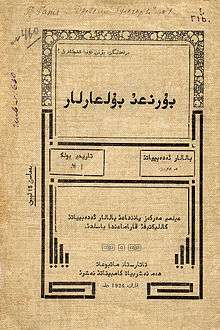Yaña imlâ alphabet
| Yaña imlâ | |
|---|---|
| Type | |
| Languages | Tatar, Bashkir |
Time period | 1920 to 1928 |
Parent systems | |

Yaña imlâ (pronounced [jʌˈŋɑ imˈlʲæ]; Cyrillic: яңа имля; Tatar for new orthography) was a modified variant of Arabic script that was in use for the Tatar language in 1920–1927. The orthographical reform modified İske imlâ, abolishing excess Arabic letters, adding letters for short vowels e, ı, ö, o. Some diacritic, that looked like comma was used to designate the vowel harmony. Arguably, Yaña imlâ had as its goal the accommodation of the alphabet to the actual Tatar pronunciation.
There were some projects that were to simplify Yaña imlâ too. The unique separated Arabic was invented (so as to use typewriters). Separated Arabic was even incorporated in the early flag of Tatar ASSR, though it was not in real use.
As early as in 1924 the first projects of Latin script were introduced and in 1928 alphabet was switched to the Latin Jaꞑalif alphabet.
| Zamanälif | Initial | Medial | Final | Stand-alone | Jaꞑalif | modern Cyrillic Tatar alphabet | Notes | |
|---|---|---|---|---|---|---|---|---|
| 1 | a | ﯪ | ﺎ | ﺎ | ﯪ | a | а | |
| 2 | ä | ﺋﻪ | ﻪ | ﻪ | ﺋﻪ | ə | ә | |
| 3 | b | ﺑ | ﺒ | ﺐ | ﺏ | ʙ | б | |
| 4 | t | ﺗ | ﺘ | ﺖ | ﺕ | t | т | |
| 5 | p | ﭘ | ﭙ | ﭗ | ﭖ | p | п | |
| 6 | c | ﺟ | ﺠ | ﺞ | ﺝ | ç | җ | |
| 7 | ç | ﭼ | ﭽ | ﭻ | ﭺ | c | ч | |
| 8 | x | ﺣ | ﺤ | ﺢ | ﺡ | x | х | |
| 9 | d | ﺩ | ﺪ | ﺪ | ﺩ | d | д | |
| 10 | r | ﺭ | ﺮ | ﺮ | ﺭ | r | р | |
| 11 | z | ﺯ | ﺰ | ﺰ | ﺯ | z | з | |
| 12 | j | ﮊ | ﮋ | ﮋ | ﮊ | ƶ | ж | |
| 13 | s | ﺳ | ﺴ | ﺲ | ﺱ | s | с | |
| 14 | ş | ﺷ | ﺸ | ﺶ | ﺵ | ş | ш | |
| 15 | ğ | ﻋ | ﻌ | ﻊ | ﻉ | ƣ | г(ъ) | alternative Cyrillic transcription: ғ |
| 16 | f | ﻓ | ﻔ | ﻒ | ﻑ | f | ф | |
| 17 | q | ﻗ | ﻘ | ﻖ | ﻕ | q | к(ъ) | alternative Cyrillic transcription: қ |
| 18 | k | ﻛ | ﻜ | ﻚ | ﮎ | k | к | |
| 19 | g | ﮔ | ﮕ | ﮓ | ﮒ | g | г | |
| 20 | ñ | – | ﯖ | ﯔ | ﯓ | ꞑ | ң | Initial form was never used due phonetic reasons |
| 21 | l | ﻟ | ﻠ | ﻞ | ﻝ | l | л | |
| 22 | m | ﻣ | ﻤ | ﻢ | ﻡ | m | м | |
| 23 | n | ﻧ | ﻨ | ﻦ | ﻥ | n | н | |
| 24 | w | ﻭ | ﻮ | ﻮ | ﻭ | v | в | alternative Cyrillic transcription: ў |
| 25 | i, í, y | ﻴﺋ | ﻴ | ﻯ | ﻴﺋ | i, ьj, j | и, ый, й | ﻴﺋ, – for í, ﻴﺋ – for i, |
| 26 | u, ü | ﯮ | ﻮ | ﻮ | ﯮ | u, y | у, ү | ﯮ, – for u, ﯮ – for ü |
| 27 | o, ö | ﯰ | ﯘ | ﯘ | ﯰ | o, ɵ | о, ө | ﯰ, – for o, ﯰ – for ö |
| 28 | ı, e | ﺋ | ﺌ | ئ | ﺋ | ь, e | ы, е | ﺋ, – for ı, ﺋ – for e |
| 29 | h | ﻫ | ﻬ | ﻪ | ﻩ | h | һ |
See also
Sources
- (Tatar) "Arabic alphabet". Tatar Encyclopaedia. Kazan: The Republic of Tatarstan Academy of Sciences. Institution of the Tatar Encyclopaedia. 2002.
| ||||||||||||||